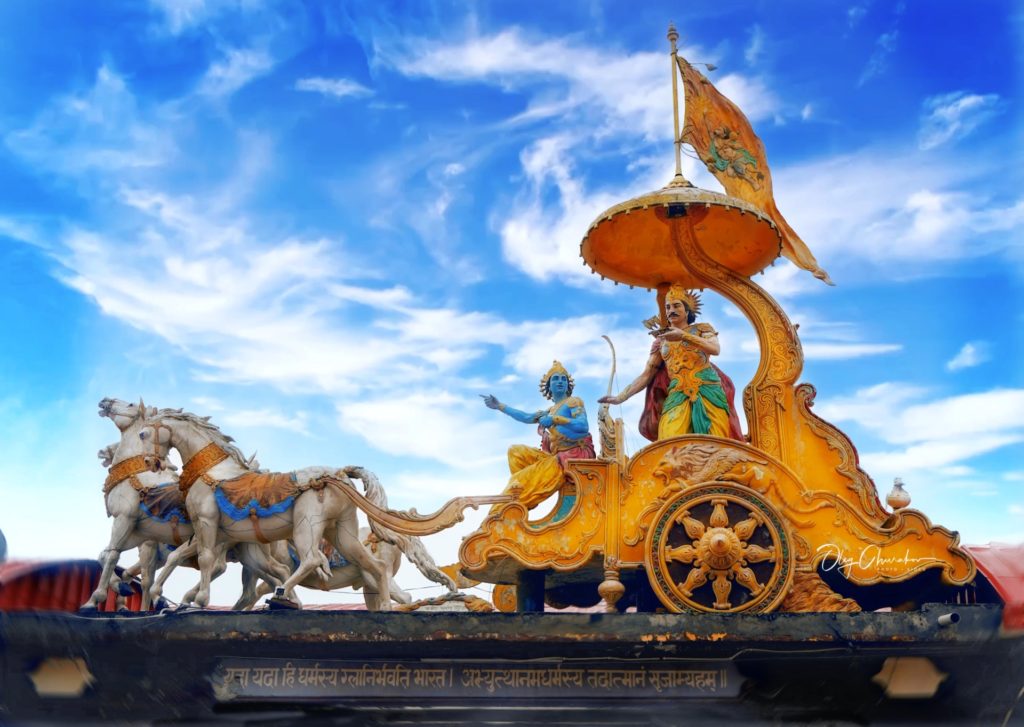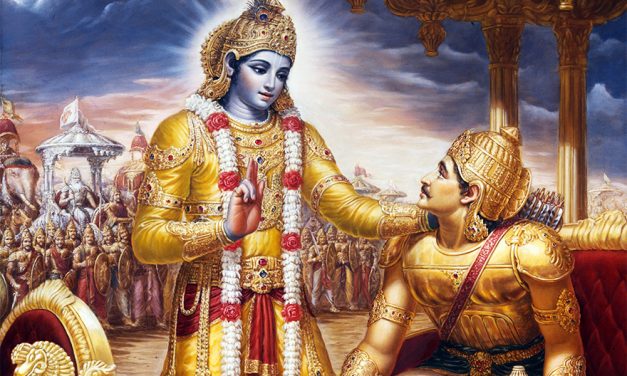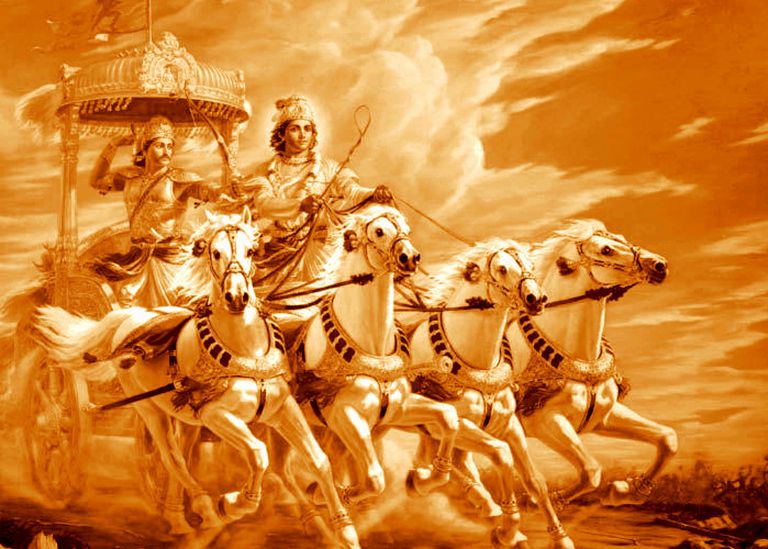Namaste!
In the last part of this series, we looked at Bhagavad Gita Chapter 3, verses 31 to 36, where Lord Krishna explains the inevitability of individuals acting in accordance with their inherent nature, their gunas, suggesting that even those with wisdom will act as per their natural disposition. Trying to suppress one’s nature is impractical and counterproductive. Instead, Lord Krishna advocates channeling our innate tendencies positively through karma yoga, aligning actions with one’s swadharma (prescribed duties), leading to spiritual growth. We ended last post with Arjuna, seeking clarity, questions Lord Krishna about the occurrence of sinful actions even when individuals do not intend to commit them, akin to a force steering a ship against the crew’s consent.
In this post, let’s look at verses 37 till 43 where this chapter ends.
Chapter 3, Verse 37:
श्रीभगवानुवाच |
काम एष क्रोध एष रजोगुणसमुद्भव: ||
महाशनो महापाप्मा विद्ध्येनमिह वैरिणम् ||
śrī-bhagavān uvāca |
kāma eṣha krodha eṣha rajo-guṇa-samudbhavaḥ
mahāśhano mahā-pāpmā viddhy enam iha vairiṇam
English Translation:
Lord Krishna said: It is desire, it is anger, born of the mode of passion, all-consuming and extremely sinful. Know this to be the enemy here on earth.
Commentary:
In this verse, Lord Krishna identifies the root causes of human suffering – desire and anger. These emotions are products of the mode of passion (rajo-guna) and have the potential to become all-consuming and highly detrimental to one’s spiritual journey. Desire – ‘kama’ – is not just about sexual desires, but also include our unbridled material cravings, while anger, denoted by ‘krodha,’ represents our unchecked reactions to unfulfilled desires. Both arise from the restless nature of the mode of passion and are labeled as great obstacles on the path to self-realization. Lord Krishna urges Arjuna to recognize these inner enemies and conquer them as they obstruct the pursuit of spiritual growth and self-mastery.
Increasing goodness – our sattva guna – diminishes the power of desires, as desires are linked to passion. Controlling our desires is essential to curbing lust and anger. These three aspects – desires, lust, and anger – are interconnected and should be addressed together. However, once desires are activated, they become insatiable and lead to uncontrolled passion. Desires grow like an unquenchable fire, often resulting in anger and destructive actions. This cycle highlights the importance of mastering desires to attain inner peace and ethical behavior.
On the other hand, can we live without any desire at all? I have written another post about it which you can read here.
Chapter 3, Verse 38:
धूमेनाव्रियते वह्निर्यथादर्शो मलेन च |
यथोल्बेनावृतो गर्भस्तथा तेनेदमावृतम् ||
dhūmenāvriyate vahniḥ yathādarśho malena ca
yatholbenāvṛito garbhas tathā tenedamāvṛtam
English Translation:
As fire is enveloped by smoke, as a mirror is obscured by dust, and as an embryo is covered by the womb, similarly, this wisdom is concealed by desire.
Commentary:
In this verse, Lord Krishna employs vivid analogies to illustrate how desire can obscure and conceal true wisdom. Just as smoke envelops fire, rendering it less visible, desire shrouds one’s inner wisdom, making it harder to discern. Similarly, dust on a mirror blurs its reflection, and the womb veils the growing embryo. Desire, with its alluring distractions, obscures our clarity of spiritual knowledge. Lord Krishna emphasizes that to attain wisdom, one must learn to manage and eventually transcend desires, allowing the true knowledge within to shine forth.
Here is a beautiful story that perfectly illustrates our human condition clouded by desires. A man’s evening forest walk turns perilous as he faces ferocious animals, an embracing witch, a deadly snake, and nibbling mice. To make the situation worse, wasps sting him as well. In this dire predicament, he smiles as he tastes honey dripping from a beehive above. Philosophers gathered around wondered at his calm, smiling demeanor, but this story mirrors the human condition under when we are swept away by our desires. In this story, the forest symbolizes the perilous material world, animals represent diseases, the witch embodies aging, and the snake signifies inevitable death. White and black mice symbolize day and night, steadily diminishing life. Wasps stinging depict agitating desires, and honey represents sensory pleasure that clouds intellect. Lustful desire obscures our power of discrimination, as Shree Krishna warns in this verse.

Chapter 3, Verse 39:
आवृतं ज्ञानमेतेन ज्ञानिनो नित्यवैरिणा |
कामरूपेण कौन्तेय दुष्पूरेणानलेन च ||
āvṛitaṁ jñānam etena jñānino nityavairiṇā
kāmarūpeṇa kaunteya duṣhpūreṇānalena cha
English Translation:
O Kaunteya (Son of Kunti, Arjuna), knowledge is covered by this eternal enemy of the wise, known as desire, which is insatiable and burns like fire.
Commentary:
In this verse, Lord Krishna describes desire as an eternal adversary of wisdom. He explains that desire obscures our knowledge and discriminative faculties, preventing us from making righteous choices. Desires are compared to an unquenchable fire, signifying their consuming and deluding nature. Just as fire is never satisfied and continues to burn, desires similarly lead individuals into an unending cycle of craving and gratification. The uncontrolled pursuit of desires hinders spiritual growth and clarity of thought, making them formidable obstacles on the path to self-realization. Krishna’s message underscores the importance of mastering desires to attain wisdom and inner peace.
What does the term “discrimination” imply in this context? Discrimination is the inherent human ability to differentiate between dharmic and adharmic choices, in other words, morally and ethically sound decisions. It acts as our moral compass, directing us towards the path of righteousness.
Chapter 3, Verse 40:
इन्द्रियाणि मनो बुद्धिरस्याधिष्ठानमुच्यते |
एतैर्विमोहयत्येष ज्ञानमावृत्य देहिनम् ||
indriyāṇi mano buddhir asyādhiṣṭhānam ucyate
etair vimohayaty eṣa jñānam āvṛtya dehinam
English Translation:
The senses, mind, and intellect are said to be the seat of desire, by which delusion bewilders the embodied soul, covering their knowledge.
Commentary:
In this verse, Lord Krishna explains that the senses, mind, and intellect collectively form the domain of desires within us. Desire arises when the senses interact with their respective objects and the mind and intellect process these sensory inputs. This desire, born of sensory experiences, can lead us to delusion and confusion. Such desires can cloud our judgment and obscure our knowledge, leading us away from the path of self-realization. This verse highlights the importance of mastering our desires and developing control over our senses, mind, and intellect to attain spiritual wisdom and liberation from delusion. How do we achieve mastery over our desires, minds, and senses, and acquire the intellect necessary for spiritual wisdom and knowledge?
Chapter 3, Verse 41:
तस्मात्त्वमिन्द्रियाण्यादौ नियम्य भरतर्षभ |
पाप्मानं प्रजहि ह्येनं ज्ञानविज्ञाननाशनम् ||
tasmāt tvam indriyāṇyādau niyamya bhāratarṣhabha
pāpmānaṁ prajahi hyenaṁ jñāna-vijñāna-nāśhanam
English Translation:
Therefore, O scion of Bharata, first control your senses. Then, with a purified mind, destroy this formidable sin, which is the destroyer of knowledge and wisdom.
Commentary:
In this verse, Lord Krishna advises Arjuna to begin his spiritual journey by mastering his senses. By first gaining control over the senses, an individual can restrain desires and prevent them from leading to unrighteous actions. Once the senses are disciplined, the mind becomes clearer and more focused. With a pure and disciplined mind, one can effectively conquer the formidable enemy of sin, which is responsible for the destruction of knowledge and wisdom. This verse emphasizes the foundational importance of sense control and a purified mind in the pursuit of spiritual growth and self-realization.
The recurring theme of Bhagavad Gita is highlighting the importance of mastering our senses and gaining control over our minds. It is our inability to govern the mind that keeps us trapped in the ceaseless pursuit of sensory pleasures. The more we chase external sources of happiness, the less likely we are to find it, often resulting in the erosion of our inner peace and true happiness. Lord Krishna thus emphasizes that the path to spiritual knowledge and ultimate self-realization hinges upon our ability to attain mastery over both our minds and senses.
Chapter 3, Verse 42:
इन्द्रियाणि पराण्याहुरिन्द्रियेभ्य: परं मन: |
मनसस्तु परा बुद्धिर्यो बुद्धे: परतस्तु स: ||
indriyāṇi parāṇyāhur indriyebhyaḥ paraṁ manaḥ
manasas tu parā buddhir yo buddheḥ paratastu saḥ
English Translation:
They say that the senses are superior to the sense objects, the mind is superior to the senses, and the intelligence is superior to the mind. However, the self (atma) is superior to intelligence.
Commentary:
Yet, Lord Krishna goes further to declare that the true self – atma – transcends even the intellect. This profound insight highlights the existence of a higher consciousness beyond the intellect, which is the core of our being. It highlights the importance of self-realization and aligning our actions with the true self, which is the ultimate source of wisdom and guidance.
Now let’s look at the final verse in this chapter.

Chapter 3, Verse 43:
एवं बुद्धेः परं बुद्ध्वा संस्तभ्यात्मानमात्मना |
जहि शत्रुं महाबाहो कामरूपं दुरासदम् ||
evaṁ buddheḥ paraṁ buddhvā sanstabhya-ātmānam-ātmanā
jahi śhatruṁ mahā-bāho kāma-rūpaṁ durāsadam
English Translation:
Thus, knowing the atma to be superior to the mind, and restraining the mind with the intellect, mighty-armed Arjuna, slay the formidable enemy in the form of desire, which is difficult to conquer.
Commentary:
In this verse, Lord Krishna imparts valuable guidance on conquering kama, desire, which is often the root cause of inner conflicts and suffering. He advises Arjuna to recognize the supremacy of our atma, the divine soul that even the Gods cannot destroy, as mentioned earlier in Chapter 2. This divine bliss sought by our soul can only be attained through spiritual objects, as worldly possessions are merely material. Cultivating this perspective enables us to train our intellect to control the mind and senses, aligning them with our spiritual aspirations.
Desire, depicted as a formidable adversary, is often insatiable and diverts us from the spiritual path. Lord Krishna instructs Arjuna, and all of us, the seekers of truth, to employ our discerning intellect to restrain and guide the mind. Through this self-discipline, fueled by a clear understanding of right and wrong, we can conquer desires and progress spiritually. Thus, we conclude Chapter 3 of the Gita.
We will start Chapter 4 next week.
ॐ पूर्णमदः पूर्णमिदं पूर्णात्पुर्णमुदच्यते
पूर्णस्य पूर्णमादाय पूर्णमेवावशिष्यते ॥
ॐ शान्तिः शान्तिः शान्तिः ॥
Om Puurnnam-Adah Puurnnam-Idam Puurnnaat-Purnnam-Udacyate
Puurnnasya Puurnnam-Aadaaya Puurnnam-Eva-Avashissyate ||
Om Shaantih Shaantih Shaantih ||
My Pranams to you!

